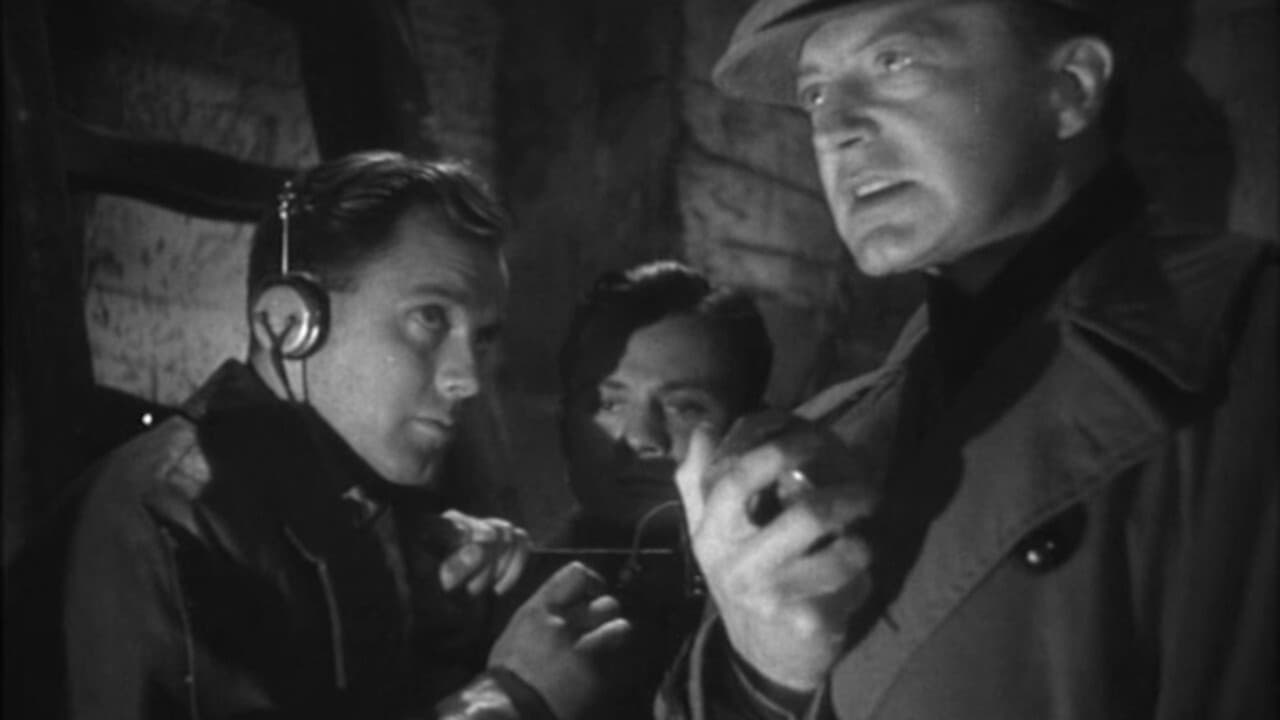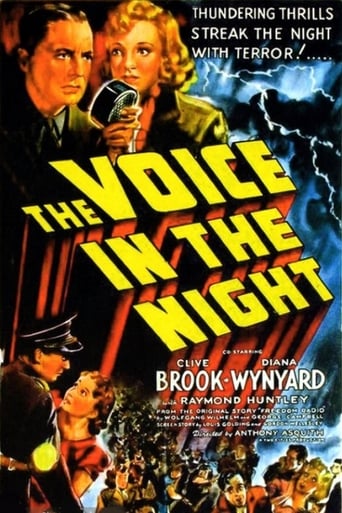

What a freaking movie. So many twists and turns. Absolutely intense from start to finish.
... View MoreIt is both painfully honest and laugh-out-loud funny at the same time.
... View MoreThis movie tries so hard to be funny, yet it falls flat every time. Just another example of recycled ideas repackaged with women in an attempt to appeal to a certain audience.
... View MoreThe storyline feels a little thin and moth-eaten in parts but this sequel is plenty of fun.
... View MoreRecently Film Four in the UK has been screening vintage British films from the 30s and 40s and this entry directed by Puffin Asquith demonstrates just how superior his early work was compared with that of Carol Reed. Reed in fact tackled a similar subject to this the year previously but his Night Train To Munich is light years away from Freedom Radio which is never risible. Okay, they had ten writers on the project and a leading man and leading lady who today would seem mannered in the extreme but they were surrounded by excellent supporting players such as Raymond Huntley, Ronald Squire, Martita Hunt, Bernard Miles and Katie Johnson, so memorable some fifteen years later in the original The Ladykillers. Reed's screenplay had nothing, for example, to compare with Ronald Squire's droll comeback when asked how he enjoyed his recent trip to America 'I didn't go to America, I went to New York'. Clive Brook manages to personify decency and the outrage felt by ordinary Germans at what they observed going on around them - again Puffin employs a crisp economical montage involving boutonnieres that disappear one by one as do their owners. A fine effort.
... View MoreThis film is currently turning up regularly on Film4 in the UK. It's still worth watching for a flavour of the sort of stuff bring shown during the second world war. Not too propagandist - in fact most of the bad things shown proved to be fact when the war was won.Incidentally, one reviewer seems to think that the doctor was German - he was in fact Austrian (like Mr. Hitler!).I didn't realise that the action was taking place in Austria as one reviewer tells us.Like others I had no problem with the actors not trying to speak with German accents. I prefer this to half the cast speaking the Queen's (or should it be King's) English and all the 'baddies' speaking with 'evil' German accents.At the date of this comment the film is appearing on Film4.
... View MoreIn the months leading up to Germany's invasion of Czechoslovakia, Hitler's own doctor gradually realises the Nazi's oppressive regime is wrong and must be opposed. His resolve is strengthened as he witnesses his wife and brother-in-law blithely embrace National Socialism.Rather nifty and extremely stylish little mid-war British propaganda piece, fascinatingly mixing cut-glass accents and 'stiff-upper-lip' acting styles with Nazi uniforms and thuggery. Though all scenes are studio-bound, this actually lends itself to the clinically oppressive atmosphere, as the viewer watches characters apparently walking late-night Berlin streets, or steering a motor launch along a canal, or watching a train pass, all the time knowing that they are confined under a sound stage roof.Freedom Radio contains an array of delicious performances, particularly amongst the supporting players - Martita Hunt as a duplicitous alcoholic, eyes flashing as she takes revenge on an innocent neighbour; Raymond Huntley's oily senior Nazi officer determined to outfox and destroy any resistance; the beautiful John Penrose's captivating portrayal of Otto, a young man seduced and corrupted by the Nazi regime. We even see a brief, early appearance by Joan Hickson over 40 years before Miss Marple! Try and track this down if you can - a must for all fans of British pre- and inter-war film and long-gone British character actors alike.
... View MoreThe title isn't promising, and certainly I could find nothing but disparagement for "Freedom Radio" when I looked it up before today's broadcast: 'tedious propaganda drama' (programme guide), 'outdated and unintentionally funny... accents totally unsuited to middle-European characters' (Radio Times). Maltin, meanwhile, doesn't even bother to give it a mention.So I was very pleasantly surprised to find it an intelligent drama about Germans in the 1930s who gradually come to realise that their country is becoming more and more totalitarian, and are pushed into an attempt at redressing the balance with the only weapon they can think of: the conviction that if only, somehow, they can get the truth out there, things will change. For our part we know, of course, that it didn't work; even they know they won't be able to get away with it indefinitely (although having an ally on the inside can prove invaluable...) But in a world where friends and neighbours are swept up by national loyalty and propaganda or become informers for their own personal profit, in a Nazi Germany that is not yet at war -- even a gesture at resistance can give hope.As a propaganda piece this is quite extraordinarily restrained: the entire cast are played (hence the 'accents' jibe -- might the reviewer have found comic Teutonic vowels less disturbing, perhaps?) as people 'like us', as ordinary Englishmen and women of the period, from the young workman to the nosy neighbour and the Society doctor. The young artist Otto, whose SS work gradually takes over his life, has the vocabulary of a thoughtless young public-school-boy; the Gestapo officer Rabenau who tracks the heroes down is an upright and keen-eyed Intelligence commander who could have stepped out of Fighter Command HQ, not a Prussian caricature. When you consider that the film was made in the darkest days of the Second World War, the decision not merely to show 'good Germans', but to show 'bad Germans' -- Nazi loyalists -- as human (and to eschew the use of heavy foreign accents to represent foreigners speaking in their own language) is impressive.If this film had been made in Hollywood, it would doubtless have featured a young Allied agent or second-generation American (like Karl von Austreim in Mary Pickford's "The Little American" of 1917 -- another film unfortunately written off as 'propaganda') to inspire the locals to acts of heroism. But there is no such facile audience-identification figure: we are forced to place ourselves in the position of pre-war Germans, those same Germans against whom the British cinema in 1941 might have been expected to whip up mindless hate. Instead, they're sympathetic characters. Some of them become ardent Nazi supporters; that doesn't make them less human. It only produces ultimately agonising conflict...Clive Brook, as ever, is superb as the thinking man's thinking man; Diana Wynyard brings conviction to the role of his wife, the actress whose talent brings favour from the Fuehrer himself. Raymond Huntley makes Rabenau a formidable yet admirable opponent who is never likely to be fooled for long, while the younger couple -- Derek Farr and Joyce Howard -- provide easy appeal to the eye as the young workman and his sweetheart.The production values betray a wartime budget: the obvious impossibility of shooting on location in Continental Europe, the stock footage of Nazi parades, and the restricted sets and shortage of extras -- for example, we only ever see Irena's stage triumphs from behind the curtain, and the Gestapo never seem to be able to muster more than half a dozen members at once. There is also a telltale moment when the supposed passage of the Budapest express is marked by the unmistakable shriek of an English locomotive whistle! The script, on the other hand, benefits from a similar parsimony. Little is stated outright if the information can instead be implied: especially in the opening sequences. We know the chilling truth behind the 'rest home' for an inconveniently hysterical witness -- the characters don't. Exposition is neatly avoided, and by and large the film displays an admirable subtlety and restraint. The exception, naturally, is in the rival radio broadcasts -- state propaganda on the one side, claims of debunking on the other -- and there were moments at the end when I felt that the content of the impassioned speeches was too obviously aimed at wartime audiences rather than the 1930s populace it supposedly addressed. But under the circumstances, and given the inevitable ending, the attempt at some kind of upbeat content is understandable.Frankly, the only reason I bothered to sit down to watch this in the first place was the presence of the names of Anthony Asquith and Clive Brook, both old friends from the silent era.... and I wasn't hoping for much. But I've seen some inferior films recently, and this, surprisingly, wasn't one of them: in fact, it reminded me rather of Leslie Howard's "Pimpernel Smith". Too 'British' for American viewers, perhaps: too 'outdated' for the modern generation. Personally, I found its depiction of a society of creeping totalitarianism both unsettling, and more than a little thought-provoking, even today.
... View More